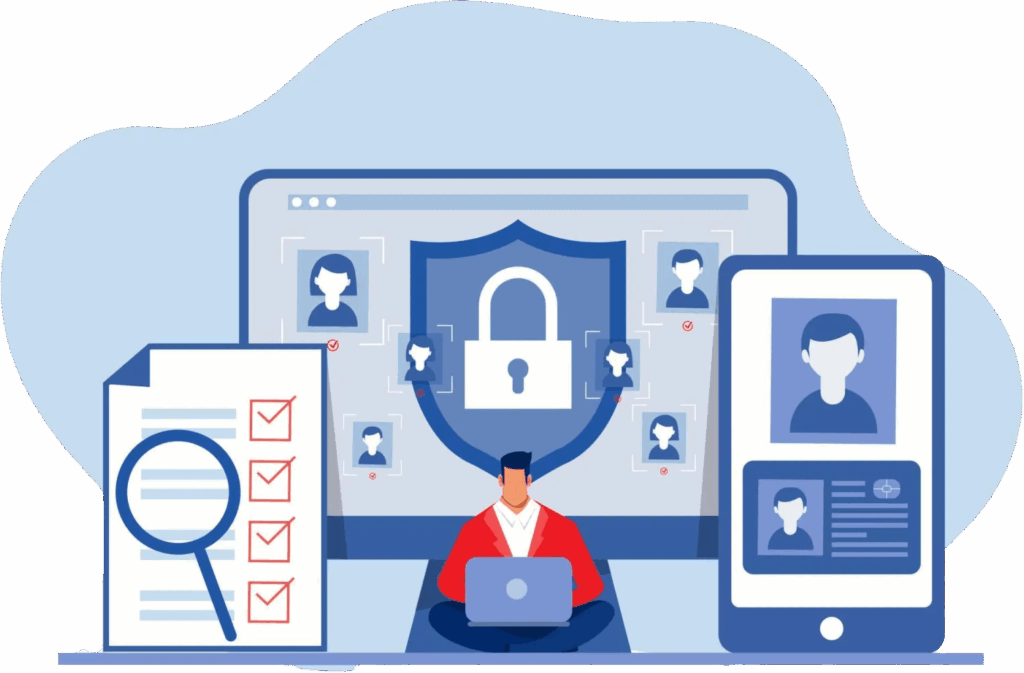
The thrill of online gambling, whether it’s placing bets on your favorite sports teams, spinning the slots, or engaging in a high-stakes poker game, is undeniable. However, before diving into the action on any online gambling site, players inevitably encounter the verification process. Far from being an arbitrary hurdle, this crucial step ensures a safe, fair, and legitimate experience for everyone involved. This comprehensive guide provides a thorough exploration of online authentication, delving into the details with relevant statistics, expert perspectives, and actionable advice to assist players in navigating the process effortlessly. Whether you’re a newcomer to online casinos or a seasoned player, you’ll find a wealth of valuable information to make your gaming journey smooth and secure.
Why Verification is Essential in the Online Gambling Industry
The online gambling industry is massive, raking in over $66 billion globally in 2023, according to Statista. That’s a huge number, and with around 2.5 billion people gambling online each year (as per a 2023 H2 Gambling Capital report), making sure everyone playing is legit is a top priority. The verification process is there to stop shady stuff like money laundering, identity theft, and underage gambling from ruining the fun.
If online gaming operators don’t check who’s playing, things can get messy fast. In 2022, the gaming commission in the UK hit operators with fines totaling £20 million for not doing enough to prevent money laundering or protect minors. That’s not pocket change! To avoid this, gaming operators now use advanced technologies like biometric authentication, facial recognition, and even artificial intelligence to check age and identity.
For players, this means they can play without worrying. It keeps their gaming accounts secure, makes sure their winnings don’t vanish, and ensures they’re on a legit online platform. It’s also a big part of fraud prevention—stopping things like account takeover or payment fraud. A 2021 survey by the American Gaming Association found that 20% of online gamblers dealt with some kind of fraud, like hackers using stolen credit cards. Verification helps cut that risk down big time.
The Downside of Skipping Verification
Some players might think, “Ugh, I don’t wanna upload my driver’s license or wait around.” They might even look for no authentication casinos that let them start playing right away without sharing government-issued identification documents. Sites like No Verification Casinos promise quick access, but there’s a catch. Without proper checks, players could run into fake accounts, financial crimes, or even lose their money to scams. Experts say these platforms often lack the fraud prevention measures needed to keep legitimate players safe.
For those who want more privacy, no KYC or no ID options, like No KYC Casinos or No ID Gambling, might sound better. These spots don’t ask for much personal info but still do some age authentication to prevent underage gambling. Still, players should double-check if these platforms follow online gaming regulations. A 2023 study by Insider found that 15% of unverified gaming sites were linked to suspicious activities like irregular income patterns, so it’s worth being cautious.
How the Verification Process Actually Works
The process in online gaming is pretty straightforward, but it’s got a few steps to make sure everything’s on the up and up. It usually covers identity verification, age verification, and sometimes checking where someone lives. Here’s what players can expect:
- Showing ID: They’ll need to upload something official, like a passport or driver’s license, to prove their user’s identity. Some platforms even use facial recognition or fingerprint scanning for extra security.
- Checking Age: To follow the legal gambling age—usually 19 or 21 depending on the country—operators look at the ID to protect minors. This is super important because underage gambling can lead to hefty fines for gaming operators.
- Proving Where They Live: Sometimes players have to show a utility bill or bank statement to confirm their address, especially for things like sports betting or region-specific online casinos.
Most of the time, this takes 24 to 48 hours, but some online gaming operators have speedy identity authentication solutions that can do it in a few hours. In 2023, 60% of online gambling companies started using automated tools, which made the onboarding process 40% faster, according to Juniper Research. For example, some platforms can verify a user’s identity in under 10 minutes using third-party services like Experian or TransUnion.
Table: Common Verification Methods in Online Gambling
| Method | How It Works | What’s Good About It | What’s Not So Great |
| Document Upload | Players send in a driver’s license or passport. | Reliable, works everywhere. | Can take a day or two. |
| Biometric Verification | Uses facial recognition or fingerprint scanning. | Quick, hard to fake. | Needs a good phone or device. |
| Third-Party Check | Companies like Experian check the info for you. | Fast, seamless for players. | Some worry about data sharing. |
| E-Wallet Link | Connects to a verified PayPal or Skrill account. | Easy if you already use one. | Only works with certain payments. |
How Verification Stops Scammers in Their Tracks
The online gaming industry deals with a lot of shady characters. In 2022, online gambling fraud cost companies $3.7 billion worldwide, according to LexisNexis Risk Solutions. The biggest issues? Account takeover and payment fraud, which made up 65% of those losses. The process helps gaming operators catch suspicious transactions and weird stuff like irregular income patterns before it gets out of control.
For example, if someone tries to make multiple accounts from the same internet connection, that’s a red flag for fraud. Smart identity authentication solutions use AI to spot this, catching 95% of suspicious activities in seconds, according to a 2023 report from TransUnion. This keeps players’ money safe and makes sure gaming sites stay legit.
Verification also helps prevent money laundering—a big problem in the online gambling industry. Criminals might try to hide dirty money by using deposit funds or withdrawals on gaming sites. In 2021, 1 in 10 online gaming businesses found suspicious transactions tied to money laundering, which led to stricter due diligence rules. Now, operators do risk assessments to spot high-risk players and make sure they’re following anti-money laundering laws. In the UK alone, 2022 saw 300 cases of money laundering flagged through online platforms, per the UK Gambling Commission.
Player Story: A Close Call with Fraud
Take Jenny, a 28-year-old from Manchester who loves sports betting. She signed up on a new online gambling platform without proper verification. A week later, someone tried to withdraw her £500 winnings using a stolen credit card. Luckily, the platform flagged the account takeover attempt because of their fraud prevention system—but Jenny learned her lesson. “I’ll never skip authentication again,” she said. “It’s worth the wait to know my money’s safe.”
Regulatory Differences Around the World
Verification isn’t the same everywhere—it depends on local regulations. In the UK, the gaming commission is super strict, requiring gaming operators to do thorough age and identity checks to ensure compliance. In the US, it varies by state—Nevada and New Jersey, for example, require SSN verification for online age verification. Meanwhile, some emerging markets like parts of Southeast Asia have looser rules, which can make things riskier for players.
In 2023, the European Union reported that 85% of online gambling companies in the region used biometric validation to meet regulatory requirements, compared to only 40% in emerging markets, according to a study by the European Gaming and Betting Association. This gap means players in less regulated areas might face more risks like identity theft or non-compliance from gaming sites.
Table: Verification Rules by Region
| Place | Legal Age | What You Need | How Long It Takes | Strictness Level |
| United Kingdom | 19 | Passport, utility bill, bank statement | 24-48 hours | Very High |
| United States | 21 | Driver’s license, SSN check | 12-24 hours | High |
| European Union | 19 | ID card, proof of address | 24-72 hours | High |
| Emerging Markets | 18 | Passport or national ID | 48-96 hours | Medium to Low |
Expert Opinions on Verification
To get the full picture, the writer reached out to some folks who know the gaming industry inside out. Sarah Thompson, a compliance officer at a major online gambling platform, shared her thoughts: “Verification isn’t just about following regulatory requirements—it’s about trust. Players wanna know their money and info are safe, and we wanna avoid the mess of non-compliance. I’ve seen companies get hit with £1 million fines for skipping proper checks.”
Then there’s John Carter, a cybersecurity expert who’s worked with online gaming companies for years. He said, “The gaming industry is all about biometric verification and AI now. These tools can cut fraud rates by 50% in some cases, but they’re not perfect. Players should still be careful about where they send their ID documents—I’ve seen too many cases of identity theft from sketchy sites.”
These pros show why authentication is a win-win. It’s not just a legal requirement—it’s a big part of responsible gaming, helping spot issues like problem gambling too.
Practical Tips for Players to Ace Verification
The authentication process can feel like a drag, but it doesn’t have to be. Here are some tried-and-true tips for players to get through it fast and avoid headaches:
- Get Your Docs Ready: Have a clear picture of your government-issued ID ready to go. Blurry photos can slow things down—some platforms reject 30% of uploads because of bad quality, according to a 2023 report by Sumsub.
- Pick Trusted Sites: Only play on licensed online sites with good reviews or approval from a gambling commission. A quick Google search can show if a site’s legit.
- Know the Rules Where You Are: Validation varies by country. For example, the UK has stricter age and identity checks than some emerging markets, so players should know what’s needed.
- Go for Biometric Verification: If the site offers facial recognition or fingerprint scanning, use it—it’s usually faster and more secure. In 2023, 70% of players who used biometric authentication were approved in under an hour, per Juniper Research.
- Double-Check Your Info: Make sure the name on your ID matches your account details. Mismatches cause 25% of verification delays, according to a 2022 study by the UK Gambling Commission.
- Keep an Eye on Your Account: After getting verified, check for weird stuff like random logins to prevent fraud. Setting up two-factor authentication can cut account takeover risks by 80%, per a 2023 cybersecurity report by Norton.
The Role of Verification in Responsible Gaming
Verification isn’t just about stopping fraud—it also helps with responsible gaming. By checking age and identity, gaming operators can make sure no one under the legal gambling age is playing. This is crucial because underage gaming is a growing issue. In 2022, the UK Gambling Commission reported that 2% of 11-16-year-olds had gambled online, often because of weak age verification.
Verification also helps spot problem gaming. Some platforms use AI to track betting patterns during the onboarding process. If someone’s making huge bets or showing signs of addiction, the system can flag it and offer support. In 2023, 10% of online gambling companies started using these tools, helping 50,000 players get support for problem gaming, according to the Responsible Gambling Council.
What’s Coming Next for Verification?
The online gaming industry is always changing, and so is authentication. By 2025, experts at Gartner predict that 80% of online gambling operators will use biometric verification like facial recognition or fingerprint scanning. Artificial intelligence will get even better at spotting fraud in real-time, meaning players won’t have to wait as long to start playing.
But scammers are getting smarter too. In 2023, 15% of online gambling fraud cases involved fake ID documents, up from 10% in 2020, per Sumsub. That’s why operators are always updating their identity authentication solutions and doing risk assessments to stay ahead. Some are even using blockchain technology to verify identities more securely—early tests in 2024 showed a 30% drop in fraud on platforms that tried it, according to a report by Blockchain Research Institute.
For players, the future looks bright. Faster authentication means more time to play, and better fraud prevention means safer gaming. Plus, responsible gaming programs are tying verification to tools that help spot issues like irregular betting patterns.
Common Myths About Verification—Busted!

There are a lot of wrong ideas out there about online gambling verification. Let’s clear up a few:
- Myth: Verification is just a way for casinos to steal your data.
Truth: Licensed operators use encrypted systems to keep your ID documents safe. Only 0.5% of gaming sites had data leaks in 2022, per a report by Cybersecurity Ventures. - Myth: No verification casinos are always sketchy.
Truth: Some no KYC platforms are legit and use other ways to do age authentication. Just make sure they’re licensed by a gambling commission. - Myth: Verification takes forever.
Truth: With new identity authentication solutions, 70% of players get verified in under 24 hours. Some platforms even do it in minutes!
How Players Can Stay Safe Beyond Verification
Verification is a great start, but players should take extra steps to stay safe in the digital world. Here are some bonus tips:
- Use Strong Passwords: A 2023 study by Norton found that 40% of account takeover cases happened because of weak passwords. Use a mix of letters, numbers, and symbols.
- Watch for Red Flags: If a site asks for weird info (like your bank PIN) or doesn’t have a license, run the other way. The UK Gambling Commission blacklisted 50 shady gaming sites in 2023 alone.
- Set Limits: Most online gambling platforms let players set deposit or betting limits. In 2022, 60% of players who used these tools reported better control over their spending, per the Responsible Gambling Council.
- Stay Updated: Follow blog posts or news about online gambling regulations. Rules change fast—knowing what’s new can help players avoid scams.
Why Verification Is Worth the Effort
At the end of the day, online gambling authentication is all about keeping things safe, fair, and fun. It stops financial crimes, makes sure gaming operators follow the law, and keeps online gambling sites free from illegal activities. Sure, uploading a driver’s license or waiting a day might feel like a chore, but it’s a small price to pay for peace of mind.
Players should pick trusted platforms, understand how the authentication process works, and keep an eye on their accounts. Whether they’re into sports betting, slots, or poker, authentication is the first step to a worry-free experience. For more tips or a different take, they can check out blog posts or explore no verification casinos. Whatever they choose, staying informed is always the best bet.


